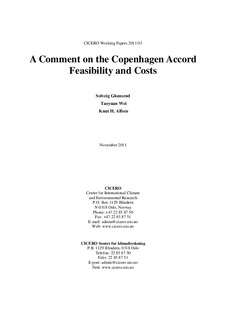| dc.contributor.author | Glomsrød, Solveig | nb_NO |
| dc.contributor.author | Wei, Taoyuan | nb_NO |
| dc.contributor.author | Alfsen, Knut H. | nb_NO |
| dc.date.accessioned | 2014-03-17T14:31:30Z | |
| dc.date.available | 2014-03-17T14:31:30Z | |
| dc.date.issued | 2011 | nb_NO |
| dc.identifier.issn | 0504-452X | nb_NO |
| dc.identifier.uri | http://hdl.handle.net/11250/192398 | |
| dc.description.abstract | The Copenhagen Accord has been followed up by national pledges of greenhouse gas emissions reductions in the year 2020 without specifying measures to enforce actions. As a consequence, the capacity of parties to fulfil their obligations is of basic interest. This article outlines the effects of full compliance with pledges on greenhouse gas emissions, economic growth, and trade. The study is based on the global computable general equilibrium model GRACE distinguishing between fossil and non-fossil energy use. Global emissions from fossil fuels in 2020 turn out to be 15% lower than in a business as usual (BAU) scenario and 3% below the global emissions from fossil fuels in 2005. China and India increase their emissions in 2020 to 1 and 5 per cent above BAU levels in 2020, respectively. We find some carbon leakage towards India, China and Russia within the energy intensive industries steel and cement.. | nb_NO |
| dc.language.iso | nob | nb_NO |
| dc.publisher | CICERO Center for International Climate and Environmental Research - Oslo | nb_NO |
| dc.relation.ispartof | CICERO Working Paper | nb_NO |
| dc.relation.ispartofseries | CICERO Working Paper;2011:03 | nb_NO |
| dc.title | A Comment on the Copenhagen Accord- Feasibility and Cost | nb_NO |
| dc.type | Working paper | nb_NO |
| dc.source.pagenumber | 22 | nb_NO |
| dc.identifier.cristin | 919726 | |
